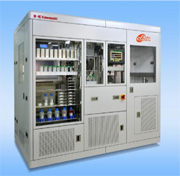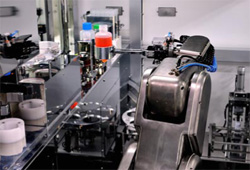Home > Highlighting JAPAN > Highlighting Japan SEPTEMBER 2011 > Automated System Developed for Human iPS Cell Cultivation
Highlighting JAPAN
SCIENCE
Automated System Developed for Human iPS Cell Cultivation
Kawasaki Heavy Industries, in collaborative research done with the National Center for Child Health and Development and the National Institute of Advanced Industrial Science and Technology, has succeeded in creating the first automated system for cultivating human iPS cells. The Japan Journal's Ames Pomeroy reports.

Human iPS cell cultivation equipment (2.1 m x 2.2 m x 1.4 m). In the future, hydrogen peroxide will be used for sterilization, enabling cell cultivation for use in regenerative medicine.
Credit: KAWASAKI HEAVY INDUSTRIES
Human iPS cells first attracted huge international attention when in 2007 Professor Shinya Yamanaka of Kyoto University became first in the world to develop a technique for their production from human skin. Since then, many human iPS cells have been cultured and provided to researchers around the world, to be used upon inducing differentiation into specific organs for example.
Yet, there still are not nearly enough human iPS cells for such research use. Developing cell cultures is by nature an extremely delicate process. Not only must specific temperatures be maintained and contamination by bacteria prevented, but it is in addition necessary to conduct delicate operations by hand such as injecting a precise amount of fluid with a pipette when the culture fluid is changed. Furthermore, before human iPS cells differentiate into various cells such as organs or nerves, even the slightest change in temperature or air pressure can cause them to start differentiating earlier than normal. For human iPS cells to be adopted practically upon development of medical treatments as well as drugs there is an urgent need to establish an efficient cultivation method.
So in 2009, Kawasaki Heavy Industries developed the first automated human iPS cell cultivation equipment in the world, AUTO CULTURE.
Kawasaki Heavy Industries began research on automated cell cultivation equipment in the mid-2000s. Until then the company hadn't made any necessarily great achievements in the field of biotechnology. However they had the strength of consistently being in the top five worldwide when it came to robotics. They had made particularly notable achievements in the area of control technology for welding robots and the like, where precise operations are a must.
"With all the mechanical technology we had accumulated, we felt that it would be useful in cell cultivation operations where a delicate touch is so important."
Katsumi Nakajima, the leader of the human iPS cell auto cultivation equipment development project, has himself done research for many years in the robotics field. He's the one who came up with the idea of automating the human iPS cultivation process by combining robotics that mimic the hand motions of humans and mechanical image processing that can judge the status of a cell in the same way as a human.

Robot arm in operation inside AUTO CULTURE carrying a culture fluid prior to pouring into Petri dishes
Credit: KAWASAKI HEAVY INDUSTRIES
It is also equipped with a system that compares image data of the human iPS cells that are being cultivated with image data of human iPS cells accumulated thus far, and can detect human iPS cells which have begun to differentiate and remove them. This makes it possible to efficiently cultivate only undifferentiated human iPS cells.
Kawasaki Heavy Industries is currently working on a faster, higher efficiency image processing system to further improve productivity.
When AUTO CULTURE completes each process, sterilization is done using alcohol spray. However, work is progressing on improving the system to use an even stronger sterilization agent, hydrogen peroxide, to prevent cell contamination and accidental infection. This will allow for the cultivation of human iPS cells for regenerative medicine, which requires an even more hygienic environment than iPS cells used for research.
"The development of drugs using human iPS cells has only just gotten underway," says Nakajima. "I'm certain that the market for human iPS cell automated cultivation devices will grow tremendously as the uses for human iPS cells increase in fields like regenerative medicine."
© 2009 Cabinet Office, Government of Japan






